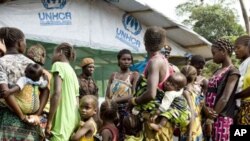The rising violence in Ivory Coast means more people are trying to get out of the country. It’s estimated the number of displaced within Ivory Coast and refugees in neighboring countries is between 300,000 and 400,000 people.
The International Office for Migration [IOM] is helping the displaced find safe haven. Spokesperson Jemini Pandya says, “There’s been very large-scale displacement within Abidjan since fighting really increased a few weeks ago. It’s extremely difficult to be able to go and assess the real scale of the displacement because the security conditions are too bad and also because of the targeting of humanitarian aid workers.”
But she adds, “One thing that our staff on the ground in Abidjan are saying is that the city is rapidly emptying, [with people] finding any way they can to get out and escape the violence. They’re leaving on public buses, vans, cars, taxis – anything they can find basically to reach their home villages.”
Conditions have also worsened for civilians in western Ivory Coast.
“IOM has now had to also evacuate its remaining staff… in the west, where there’s been significant internal displacement… because of the conflict,” says Pandya.
Asking for help
Mali, Burkina Faso, Liberia and Mauritania have all asked the IOM for help in evacuating their nationals from Ivory Coast.
“The requests from Mali, Liberia and Burkina Faso came actually at the start of the year, when the crisis already had reared its head. It had been going for some few weeks and they had put in a formal request then,” she says.
“We are also working with the neighboring governments [in] Guinea and Ghana, as well, to help in the reception and reintegration of those people who have already left Cote d’Ivoire and crossed their borders. But it doesn’t mean to say that IOM will not be also asked by these other countries to also help their nationals return home,” she says.
Most recently, the IOM has been evacuating hundreds of Mauritanians from Abidjan at the request of their government.
“The first IOM convoy… left last Friday and they reached Bamako in Mali on Sunday, despite many, many roadblocks and insecurity along the route. So, now we’re evacuating, hopefully, either today or tomorrow, another 470 Mauritanians. But we also are aware that there are at least 650 more Mauritanians, who are… registered with us to be returned home, who will also need evacuation assistance,” says Pandya.
Mali has now informed the IOM that 20,000 of its citizens, who are migrant workers in Abidjan, need help in leaving the city.
“Now among them,” she says, "is a priority group of about 100 women and children who arrived at the embassy over the weekend urgently asking for us to help them go home. And we’ve also been referred 800 Burkinabe migrants who need help to go back home.”
Pandya says this may only be the beginning of requests to help foreigners leave Ivory Coast. “We have to be able to respond to these requests as soon as possible,” she says.
All this costs money
Does IOM have the resources it needs to meet all the requests for evacuations? Pandya says, “The answer is definitely no. It requires an awful lot of financial resources as well to be able to carry out evacuations, whether it’s by land or by air. And we have had very minimal response to an initial appeal we put out in January. A very modest figure of three and a half million [dollars] is what we asked for then.”
IOM says it has received just over one million dollars so far, most of it from the U.S. government. A revised appeal is expected within a few days requesting a higher amount due to the worsening situation in Ivory Coast.
Across the border
In neighboring Liberia, it’s estimated there are between 70,000 and 90,000 Ivorian refugees. Tuesday, the U.N. High Commissioner for Refugees, Antonio Guterres, visited the country, including Nimba County, where most of the Ivoirians are located. UNHCR has set up several camps for them.
Oxfam is one of many aid agencies in Liberia. Spokesman Olivier Germain says it’s focusing on providing clean water and sanitation. A week ago, it brought in enough emergency supplies for about 70,000 people.
Those supplies are being transported to the bordering counties with Ivory Coast to be able to respond to the need and provide basic water and sanitation services to the refugees in the camps and the centers being set up there.
Oxfam, like the IOM, is appealing to donors to contribute more money to deal with the crisis.
Germain says, “We’re also encouraging UNHCR and other partners to provide necessary transport to move the refugees… along the border and… those who want to move further inland to a safer location, where the humanitarian agencies can provide more sustainable services in terms of shelter, water, sanitation and food.”




